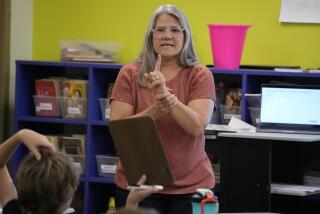Improving Math Education
Re “Formulas for Math Problems,” Jan. 5: The ingredients of a successful program of math instruction are no mystery. Adherence to a few basic principles will go a long way toward producing the desired results.
1. Develop facility with numbers. Multiplication and division tables should be learned through drills until arithmetic manipulation becomes second nature. Calculators should not be allowed until this proficiency is achieved.
2. Do not allow making mathematics fun or easy to become a priority. Those with an aptitude for it will enjoy it and others may not, just as all students do not appreciate great literature on first exposure.
3. Allow only qualified teachers to provide math instruction. If necessary, have all classes taught by math specialists, even in lower grades.
4. Make teachers accountable for each term’s syllabus. Passage of a standardized test should be a requisite for advancement to the next level.
MICHAEL HORSTEIN
Los Angeles
* Your article about math exposed our own educators’ lack of understanding of what mathematics really is--a set of rules for numbers. As such it cannot be intuitively understood, but must be learned the hard way, starting with a clear presentation by the teacher, followed by plentiful repetition by the student at home and in the classroom.
Pythagoras spent years scratching his beard, staring at circles, squares and triangles before he came up with his famed theorem. The average teenager does not have the inclination or the attention span necessary to understand its proof. If you solve 500 problems in writing, you will know it for life.
Knowing math promotes logical thinking and helps you cope with our evermore technological world. Understanding math makes you a good math teacher. Until our educators and elected school board officials are similarly enlightened, I don’t see much hope for improved test scores for high school students.
IVAR SCHOENMEYR
San Juan Capistrano






